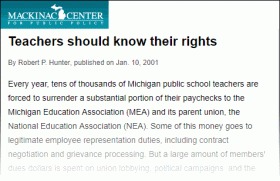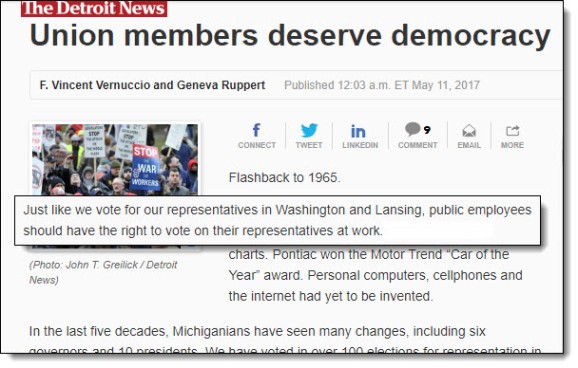Just issued by Mike Shoudy, MEA General Counsel. This document will be revised as new information emerges.
Frequently Asked Questions Regarding the Retirement Litigation
December 21, 2017
By: Michael M. Shoudy
MEA General Counsel
1. What changes happened in 2010 to the Michigan Public School Employees
Retirement Act (MPSERA)?
On May 19, 2010, the Michigan Legislature enacted Public Act 75 (PA 75) which
amended the MPSERA. The amendments, in part, required public school
districts and other reporting units to withhold 3% of each employee’s wages and
remit the amount to Michigan Public School Employees Retirement System
(MPSERS) which were classified as “employer contributions” to the trust that
funds retiree health care benefits.
2. What did MEA do?
MEA and AFT filed suit on behalf of their members challenging the
constitutionality of PA 75.
3. What happened in the courts regarding PA 75?
On July 13, 2010, the trial court issued a preliminary injunction providing that the 3% levy from wages of all applicable MPSERS members pursuant to PA 75 would be held in a separate interest-bearing account (escrow) until the trial court issued its ruling.
On April 1, 2011, the trial court issued its opinion finding that PA 75 was unconstitutional. The state appealed that decision to the Michigan Court of Appeals.
On August 16, 2012, the Michigan Court of Appeals held that PA 75 violated multiple constitutional provisions set forth in the Michigan and U.S. Constitutions, and therefore PA 75 was unconstitutional.
On September 27, 2012, the state filed an application for leave to appeal with the Michigan Supreme Court. The Supreme Court took no action on the application for nearly two years.
On July 1, 2015, the Michigan Supreme Court vacated the Court of Appeals August 16, 2012 ruling and remanded the case to the Michigan Court of Appeals to reconsider its prior ruling based on the Michigan Supreme Court’s April 8, 2015 decision regarding 2012 Public Act 300 (discussed below).
On June 7, 2016, the Court of Appeals issued its second decision regarding the constitutionality of PA 75. The Court of Appeals again found PA 75 unconstitutional, as the Act violated multiple constitutional provisions set forth in the Michigan and U.S. Constitutions.
On July 19, 2016, the defendants through Governor Snyder filed an application for leave to appeal with the Michigan Supreme Court.
On June 1, 2017, the Michigan Supreme Court issued an order granting the defendant’s application for leave to appeal.
The Michigan Supreme Court issued a final decision in the PA 75 case on December 20, 2017, and WE WON. See question 8 below.
4. What happened in 2012 to the MPSERA?
On September 4, 2012 and in response to the Michigan Court of Appeals’ August 16, 2012 decision regarding PA 75, the Michigan Legislature enacted Public Act 300 (PA 300) which amended the MPSERA. Public Act 300 required all actively employed members of MPSERS to make certain elections regarding their pensions and retiree benefits.
5. What did MEA do?
MEA and AFT filed suit on behalf of their members challenging the constitutionality of PA 300.
6. What happened in the courts regarding PA 300?
On November 29, 2012, the trial court issued a ruling dismissing MEA’s and AFT’s lawsuits. The parties appealed to the Michigan Court of Appeals.
On January 14, 2014, the Michigan Court of Appeals issued its decision affirming the trial court ruling finding PA 300 constitutional. The Court of Appeals reasoned that the voluntary nature of the contributions under PA 300 remedied the constitutional defects found in PA 75. An application for leave to appeal was filed with the Michigan Supreme Court. The Supreme Court granted the application on May 22, 2014 in the PA 300 case.
On April 8, 2015, the Michigan Supreme Court issued its decision regarding PA 300. The Court found PA 300 constitutional. In that decision, the Court noted “we emphasize that we address in this case only 2012 PA 300 and do not decide whether the Court of Appeals correctly held that 2010 PA 75 violated those same provisions.”
7. Did the defendants appeal the June 7, 2016 decision of the Michigan Court
of Appeals in the PA 75 case?
Yes, through Governor Snyder. The Governor publically announced his decision
to file an application for leave to appeal with the Michigan Supreme Court. The
Attorney General declined representation. A special assistant attorney general
was appointed. On July 19, 2016, the defendants filed their application. We filed
a response to the application. On June 1, 2017, the Michigan Supreme Court
issued an order granting the defendant’s application for leave to appeal. In other
words, the Supreme Court decided to review the decision of the lower court. The
parties filed additional briefs, and oral argument was held on November 8, 2017
in which MEA participated on behalf of its members.
8. Did the Michigan Supreme Court issue a final ruling in the case?
Yes. On December 20, 2017, the Supreme Court issued a 6 to 0 decision,
finding that PA 75 violated the Contract Clauses of the federal and state
constitutions. In other words, WE WON. The Court held: “Because 2010 Public
Act 75 is unconstitutional, the funds collected pursuant to that act before the
effective date of 2012 Public Act 300 must be refunded to the plaintiffs in
accordance with the Court of Appeals judgment.” Since the Michigan Supreme
Court is the highest court in the State, the decision cannot be appealed by the
defendants to any other state court. As this case primarily presents issues of
state law, an appeal to the US Supreme Court is highly unlikely.
9. What time period does the decision cover?
The Court of Appeals concluded that PA 75 was unconstitutional “as it existed
from its effective date until the effective date of 2012 PA 300.” Likewise, the
Michigan Supreme Court held “the funds collected pursuant to that act [PA75]
before the effective date of 2012 Public Act 300 must be refunded to the plaintiffs
in accordance with the Court of Appeals judgment.” ORS reports the time period
as July 2010 until September 2012. PA 300 went into effect on September 4,
2012.
If you chose retiree health benefits under PA 300, any payments under that Act
are lawful and not subject to this lawsuit or eligible for refund. See questions 4-6
above regarding PA 300.
10. Will I get a refund? If so, when?
If you had money taken out of your paycheck under PA 75, you are entitled to a
refund.
It is unknown, at this time, when or how your money will be refunded. Per the
Supreme Court and the Court of Appeals, the case will be remanded to the trial
court “which shall direct the return of the subject funds, with interest, to the
relevant employees.” We ask for your patience as we work through the logistics
with the trial court and the Office of Retirement Services. We will advocate for
the full return of your money as quickly as possible and keep you informed of any
developments.
11. What happens if I have retired? What happens if a member died?
It is MEA’s position that all members that had monies taken out of their checks
under PA 75 are owed a refund plus interest based on the actual amount taken.
Different members may have had different amounts taken based on individual
circumstances such as retirement dates, leave of absences, etc. We will also
advocate for a full accounting by the state in the trial court.
If a member unfortunately died before the conclusion of this case, it is our
position that the money should go to the member’s estate.
12. Where is the money?
As noted above, the trial court ordered the money at issue to be placed in an
interest-bearing escrow account. The account has a balance of more than
$550,000,000. The money is still being held in that account.
13. When the money is returned, will it be subject to taxes?
The trial court will make decisions about eligibility, payment, and methodology.
The IRS will likely take the position that the returned money is wages subject to
taxation. More information will be provided as we know more. MEA Legal will
continue to advocate for our members to receive the quickest and largest
possible refund consistent with the court decisions and the law.
14. Who is paying for the special assistant attorney general?
According to an MLive article dated November 8, 2017, Michigan taxpayers, as
of the date of the article, have spent at least $196,000 on outside attorneys at the
Dykema law firm since Governor Snyder decided to proceed on his own.
15. I heard MEA is asking for members’ contact information. Is that true?
Why?
MEA wants to keep all members up-to-date on this important case and might
need to communicate with you on an individual basis regarding your refund. We
suggest that you make sure that MEA has your current contact information
including home address, telephone number, cell phone number, and home email address.
You can send that information to the webmaster@mea.org. It is helpful
if you identify yourself by name, membership number (if you know it), and local
association/school district. We make all attempts to not communicate with
members on school email because of legal concerns.
16. What happens if there is an issue with my refund, but I am not a member in
good standing?
Only members in good standing are entitled to the full range of legal services
available under the MEA Legal Representation Policy.
18. Is this case supported by dues dollars?
Absolutely. More than seven years of complex litigation is costly. This case is
just one of many examples of your dues dollars in action. No one person could
have taken on this fight alone. We are stronger when we are together.
19. What if this FAQ doesn’t answer my question?
We know this case is of great interest to the membership. We will continue to
update this FAQ when we have additional information to share. We ask for your
patience as we continue to advocate on your behalf. If you do have additional
questions, please submit those to webmaster@mea.org.


















